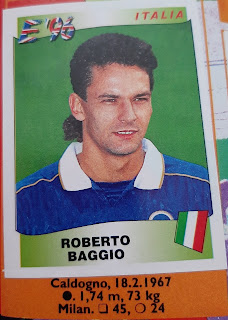182: Marcus Stewart, Ipswich Town, Merlin’s F.A. Premier League 2001 Official Sticker Collection
William
Shakespeare is believed to have invented nearly 1700 words in the English
language as well as some of its most commonly used phrases. It’s neither here
nor there and you’d be up in arms if I listed them all here and, anyway, that
way madness lies. Whilst it would be unwise to compare football punditry to the
work of the immortal bard it is fair to say that the beautiful game has
provided the English language with a plethora of phrases that have gone into
everyday parlance. Commentators and pundits, not to mention managers and
players, have given us such gems as ‘a game of two halves’, ‘taking it one game
at a time’ and ‘second season syndrome’ in order to describe a range of
situations both on and off the pitch.
That
is not to say that all pundits are gifted with the greatest turn of phrase.
Former striker Michael Owen is perhaps one of the worst offenders when it comes
to breaking cricketing legend Richie Benaud’s golden commentary rule of keeping
quiet unless you can add to the picture. During his tenure with BT Sport Owen
has shared such pearls of wisdom as “when they don’t score they hardly ever
win” and “whichever team scores more goals usually wins”. And to think we
started with Shakespeare.
But
it is on these insights from Michael Owen that we come to Marcus Stewart. In
the 2000/01 Premier League season newly promoted Ipswich Town defied
expectations and finished fifth in the table, only four points off
runners-up Arsenal, and qualified for the following season’s UEFA Cup. This
success owed much to the goals of striker Marcus Stewart who scored 21 times in
all competitions as Ipswich married their league success with a run to the
semi-final of the League Cup. Stewart was beaten to the Golden Boot award by
Chelsea’s Jimmy Floyd Hasselbaink but established himself as a respected
Premier League goal scorer and, despite losing goalkeeper Richard Wright to
Arsenal at the end of the season, Ipswich fans had every reason to look forward
to the 2001/02 season with optimism.
To
return to our footballing phrases, Ipswich Town’s performance in the 2001/02
season was the epitome of ‘second season syndrome’. They won just once in the
league before mid-December, against fellow strugglers Derby County, and,
despite a good run of form at the turn of 2002, were relegated to the First
Division. Their foray into Europe saw them reach the third round of the UEFA
Cup before they were unceremoniously dumped out of the competition by
Internazionale. Stewart acquitted himself reasonably well but, like his club,
failed to reach the dizzying heights of the year before and finished the season
with ten goals to his name before departing for Sunderland.
Unfortunately,
Stewart suffered the indignity of back-to-back relegations as Sunderland
crashed out of the Premier League with a dismal 19 points and only four wins to
their name. Stewart contributed only five goals throughout the season with just
one in the Premier League. To his credit he stuck around for the next two
seasons to help Sunderland return to the Premier League, contributing 26 goals
in doing so, but, at the age of 33, decided he was now too old to play in the
top division and moved to Bristol City in 2005 – a brave move for a former
Bristol Rovers’ player. After stints with Yeovil Town and Exeter City he
retired in 2011.
To
label Marcus Stewart a one-season wonder would be unfair to a man who scored
nearly two hundred goals in his career but his, and Ipswich’s, incredible
2000/01 season was undoubtedly his greatest achievement. While he never
recreated these “salad days” at the highest level, Stewart did temporarily
crack the Premier League’s glass ceiling and gave all newly promoted clubs with
a half-decent striker the belief that “meaner creatures could be kings”.
However, Michael Owen might have had a point as, when Stewart stopped scoring,
Ipswich hardly ever won.





Comments
Post a Comment